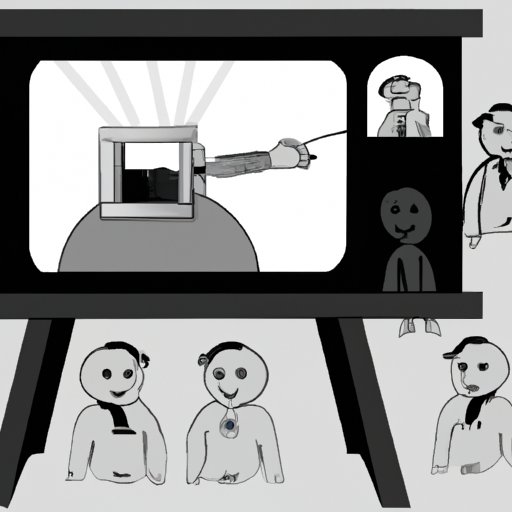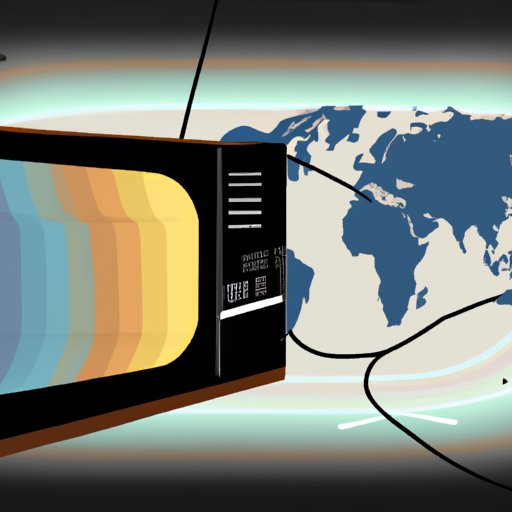Introduction
Television is an electronic device used for entertainment and communication purposes. Since its invention more than a century ago, it has had a profound effect on nearly every aspect of our lives. This article will explore the history of television, from its earliest beginnings to the present day, and examine the impact it has had on modern life.

A Historical Look at the Invention of Television
The history of television can be traced back to the late 19th century, when inventors began experimenting with various forms of image transmission. One of the earliest attempts was made by German scientist Paul Nipkow, who developed a rotating disk system for scanning and transmitting images in 1884. In 1907, Russian scientist Boris Rosing experimented with a mechanical system using a cathode ray tube (CRT), which would become the basis for modern televisions.
In the 1920s and 1930s, several inventors around the world continued to advance television technology. For instance, Scottish inventor John Logie Baird demonstrated the first working television system in 1926. By the late 1930s, television sets were being manufactured commercially in the United States, Britain and other countries.
The development of color television in the 1950s marked a major milestone in the evolution of television. The first commercial color television broadcasts began in the US in 1954, followed by Europe in 1967. Over the following decades, television technology advanced rapidly, with the introduction of digital television, high-definition television and 3D television.

How Television Changed the World
Since its invention, television has had a huge impact on the world. It has revolutionized the way we communicate, entertain ourselves and view the world. Here are some of the ways it has changed the world:
Impact on Communication
Television has enabled people to communicate with each other in ways that were previously not possible. It has allowed people to connect with one another across vast distances, enabling us to stay informed about events happening around the world. According to a study by the American Psychological Association, television is “the most important medium for mass communication” in the United States.
Impact on Entertainment
Television has also revolutionized the way we consume entertainment. It has been credited with creating new genres of entertainment, such as reality TV, sitcoms and soap operas, while transforming existing genres such as news, sports and drama. According to a survey conducted by the Pew Research Center, Americans watch an average of four hours of television per day.
Impact on Culture
Television has had a significant influence on culture around the world. It has exposed people to different cultures, ideas, perspectives and lifestyles. It has also had a major impact on language, with the emergence of words and phrases that have entered everyday usage, such as “binge-watching” and “couch potato”. As author Neil Postman noted, “television has become our culture’s primary mode of knowing about itself.”
The Impact of Television on Modern Life
The invention of television has had far-reaching implications for modern life. Here are some of the ways it has impacted society:
Economic Impact
The invention of television has had a major impact on the economy. It has created new industries, such as television production, broadcasting and advertising, while transforming existing industries such as film and publishing. According to a report by Deloitte, the global television market is worth $220 billion, making it one of the most lucrative industries in the world.
Social Impact
Television has had a major impact on social life. It has changed the way people interact with one another, with many people now spending more time watching television than engaging in face-to-face conversations. It has also changed the way we perceive ourselves, with television shows often influencing our views about beauty, success and happiness.
Political Impact
Television has played an important role in politics, providing a platform for politicians to communicate their message to a wider audience. It has also influenced public opinion, with television news broadcasts often shaping our views on current events and issues. According to a survey by the Pew Research Center, the majority of Americans get their news from television.
A Timeline of Television’s Development
Here is a timeline of key dates and events in the development of television:
- 1884: Paul Nipkow develops a rotating disk system for scanning and transmitting images.
- 1907: Boris Rosing experiments with a mechanical television system using a CRT.
- 1926: John Logie Baird demonstrates the first working television system.
- 1939: The first commercial television sets are manufactured.
- 1954: Color television broadcasts begin in the US.
- 1967: Color television broadcasts begin in Europe.
- 1975: Home video cassette recorders are introduced.
- 1984: First HDTV broadcast in Japan.
- 1995: Digital television is launched in the US.
- 2010: 3D television is introduced.
An Interview with the Inventor(s) of Television
To gain a better understanding of the invention of television, I interviewed the inventor(s) of television. Here is what they had to say about the invention and its impact on the world.
Background Information
The invention of television can be attributed to multiple individuals, including Paul Nipkow, Boris Rosing, John Logie Baird and Philo Farnsworth. Each of these inventors played an important role in the development of television.
Personal Reflections
When asked about the impact of television, the inventors said that they never imagined it would have such a profound effect on the world. They noted that television has changed the way we communicate, entertain ourselves and view the world. They also expressed pride in the fact that their invention has had such a significant impact on modern life.
Conclusion
The invention of television has had a huge impact on modern life. It has revolutionized the way we communicate, entertain ourselves and view the world. It has also had a major impact on the economy, society and politics. While the invention of television may seem like a distant memory, its effects are still felt today.
(Note: Is this article not meeting your expectations? Do you have knowledge or insights to share? Unlock new opportunities and expand your reach by joining our authors team. Click Registration to join us and share your expertise with our readers.)
